Car Smells Like Rotten Eggs?!? (Here’s What to Check)
Sniffing a rotten stench when you start up your car is enough to make anyone gag. If your vehicle smells like sulfur or rotten eggs, something is definitely amiss.
Here, we go over potential causes behind rotten egg fumes in your car and how to best get rid of the smell so it doesn’t linger and leave you and your passengers gasping for fresh air.

See Also: 6 Reasons Your Car A/C Smells Bad
Why Does My Car Smell Like Rotten Eggs?
If your car is starting to give off a rotten egg smell, there are a few potential causes out there. And before you rush off to a mechanic to have them diagnose it and fix it for you, it’s worth getting a better understanding of what’s going on.
Whether you plan on fixing it yourself or just want to ensure your mechanic isn’t taking advantage of you, here are five different causes of a rotten egg smell in your car.
#1 – Faulty Catalytic Converter
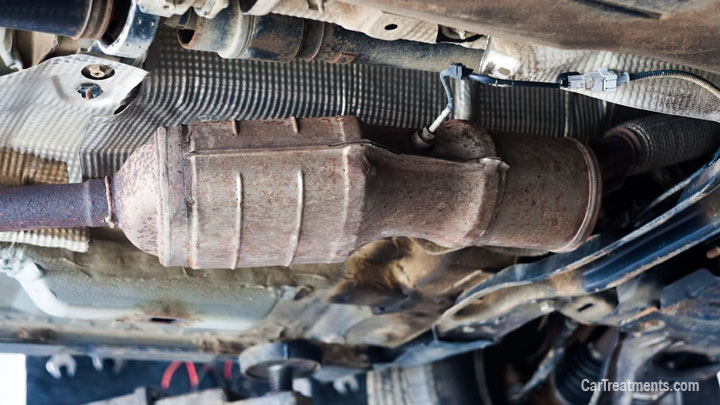
This is by far the most common cause of a rotten egg smell in your vehicle. When everything is working properly with your vehicle’s catalytic converter it converts toxic chemicals into harmless H2O compounds – otherwise known as water or steam.
However, over time these harmful chemicals and gasoline can clog up portions of the catalytic converter, and when that happens it can’t convert it the way it needs to. With a clogged catalytic converter, instead of turning into water or steam, the hydrogen sulfide turns into sulfur dioxide, which creates the rotten egg smell.
Related: Why Does My Car Smell Like Gas?
#2 – Faulty Fuel Pressure Sensor
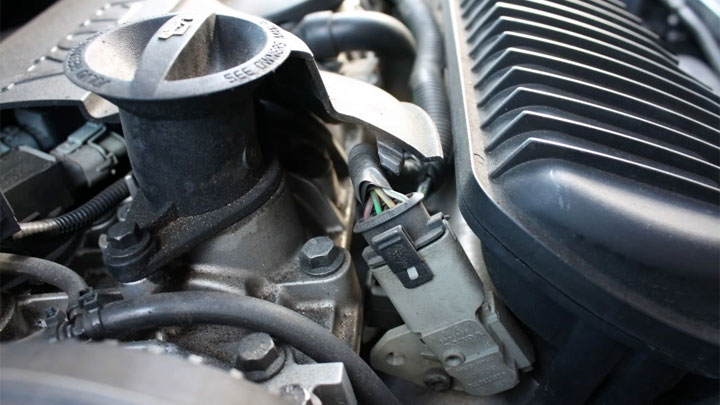
A very common occurrence when you’re noticing a rotten egg smell coming from your vehicle is that a faulty fuel pressure sensor is sending too much fuel into the system and it’s clogging up your catalytic converter since it can’t process that much at once.
This is especially true if it’s happening before you would expect the catalytic converter to give out, which is about ten years or 200,000 miles. Keep in mind that even if you have a bad fuel pressure sensor, if you’re getting a rotten egg smell, you’ll still need to replace the catalytic converter too.
This isn’t an either/or option here, it’s just a matter of whether or not you need to replace both components so your vehicle’s new catalytic converter doesn’t wear out prematurely.
#3 – Old Transmission Fluid
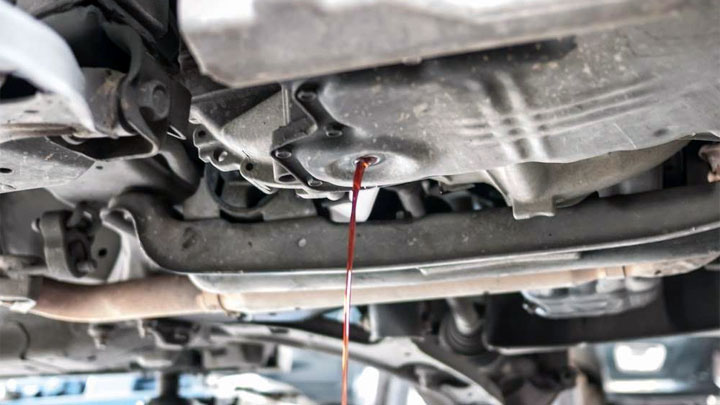
If you drive an older vehicle, especially a manual, chances are you need to change out the transmission fluid every once in a while. The exact service intervals are laid out in your owner’s manual, but if you don’t change it out when you should, it can wear out seals and start to seep into places it shouldn’t be.
When that happens, it can put off a wide array of smells, but some that are often described are rotten eggs or sour milk. If this is happening to your vehicle you’ll need to change the transmission fluid, but there’s also a good chance you’ll need to replace some gaskets or seals too.
#4 – A Dead Animal
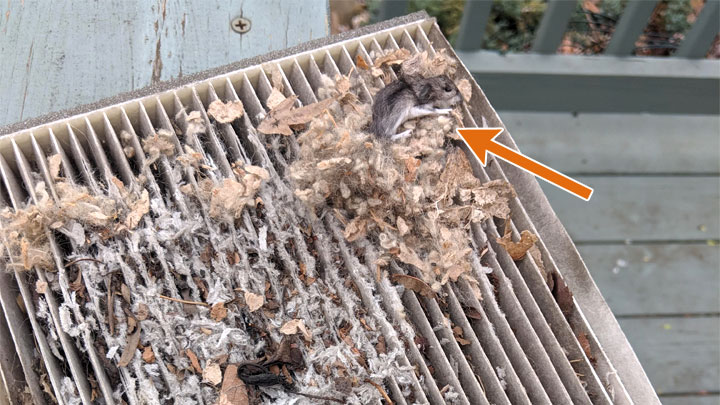
While everything we’ve highlighted up to this point has been mechanical issues, there are a few other possible explanations. One that happens more often than you might think is a dead animal (usually a mouse or rat) in your engine bay, exhaust system, HVAC system, or car interior.
When the weather gets cold, animals look for a warm place to sleep, and engine bays and exhaust systems often fit the bill. The problem is when you start your car it can end up killing them, and then their bodies start to decompose.
As you can imagine this doesn’t smell good, and it might be the reason you have an unpleasant odor following your car around.
Related: How to Get Skunk Smell Out of Car
#5 – Forgotten/Hidden Groceries

Sometimes a rotten egg smell is just that, a rotten egg. While it’s not the most likely scenario, sometimes groceries slide around your car and get lost under some seats. Or maybe you’re going through a bad breakup and your ex cracked an egg in a hidden part of your car.
Either way, sometimes if you smell rotten eggs in your car, it’s because there’s a rotten egg, spoiled milk, broccoli, or some other rotten groceries in there!
Can I Continue Driving My Car?
You might think that since a rotten egg smell likely comes from an emissions component you can drive around for a while without worrying about it. While that might be the case for most cars, because of the potential downside we highly recommend against it.
If the catalytic converter is clogged it can start to overheat, and if it gets too hot it can catch on fire. This is obviously the worst-case scenario, but it’s why you don’t want to ignore a rotten egg smell in your car!
How to Get Rid of the Rotten Egg Smell?
Alright, you know you have a rotten egg smell in your car, now it’s time to figure out what you need to do to fix it.
Sure, you can take it to a mechanic, but even if that’s your plan of action we highly recommend completing the following steps so you know what’s going on and they don’t end up trying to pull a fast one on you and costing you more money.
#1 – Scan For Trouble Codes
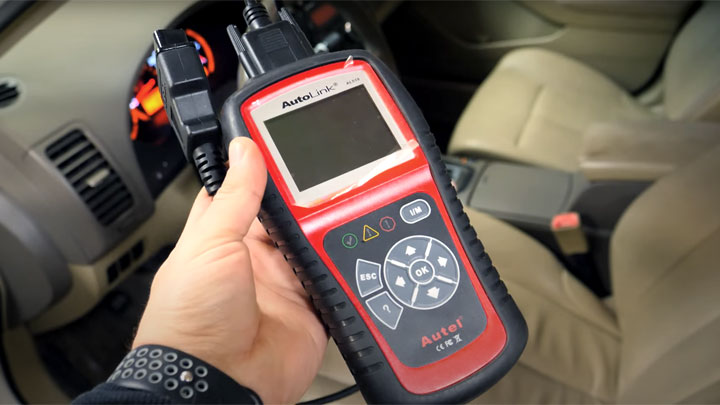
First, there’s a good chance your vehicle has a check engine light at this point too, and the first thing you want to do is see what that code is telling you.
You can get your own top-notch automotive scan tool to do this, or you can take it to a local part store like AutoZone and they’ll read the code for you for free. Even if you don’t see a check engine light, we highly recommend doing this to ensure there’s not a code and a faulty check engine light.
#2 – Check Transmission Fluid
Next, check the transmission fluid service interval for your vehicle and compare it to when the last time someone changed the oil. If there’s a major discrepancy here, there’s a good chance the smell is transmission fluid related.
If you’re low on fluid, you’ll need to check through a ton of different components to see where it might be leaking, then fix the leak and change the fluid.
#3 – Search Your Vehicle
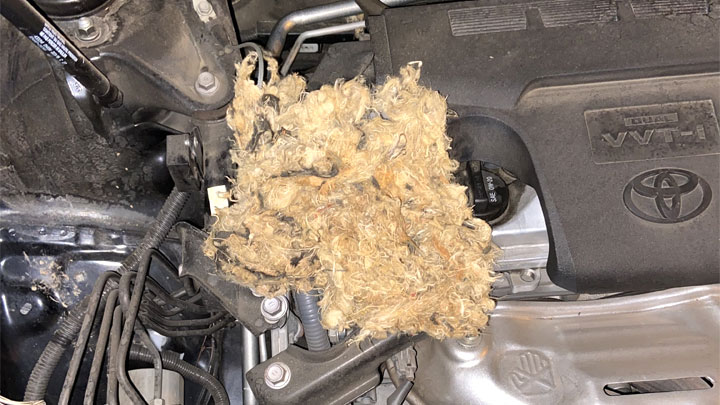
However, if there’s no code and your transmission fluid isn’t old, it’s time to start searching your vehicle. While it’s possible that the catalytic converter is giving out and there’s no check engine light, it is a bit odd.
Just do yourself a favor and go through everything to rule out hidden groceries, a prank, or a dead animal somewhere.
#4 – Check Fuel Pressure Sensor
The next recommended test is to look at the output specs on the fuel pressure sensor, but you’ll need an automotive scan tool to do this. It’s also unlikely that the sensor is giving out without giving you an engine code though.
Once you’ve checked all these things, it’s a relatively safe assumption to think that the smell is coming from a faulty catalytic converter. To eliminate the smell, replace the converter!
Will the Odor Go Away on Its Own?
One thing’s for sure, if you have a rotten egg smell in your car, it’s not going to go away all on its own. In fact, if you don’t troubleshoot and address the issue, it’s just going to get worse.
It doesn’t matter if it’s groceries that you missed or a faulty converter, the problem is only going to worsen until you remove the cause!
If you’re unable to do the work yourself, we recommend taking your vehicle to a mechanic sooner rather than later so they can give you an estimate and fix whatever is going on.
- P0521 Code (Symptoms, Causes, How to Fix) - Mar 22, 2024
- How to PROPERLY Clean 5 Types of Steering Wheel Materials - Feb 19, 2024
- What Should You Do If Your Check Engine Light Comes On? - Nov 6, 2023
